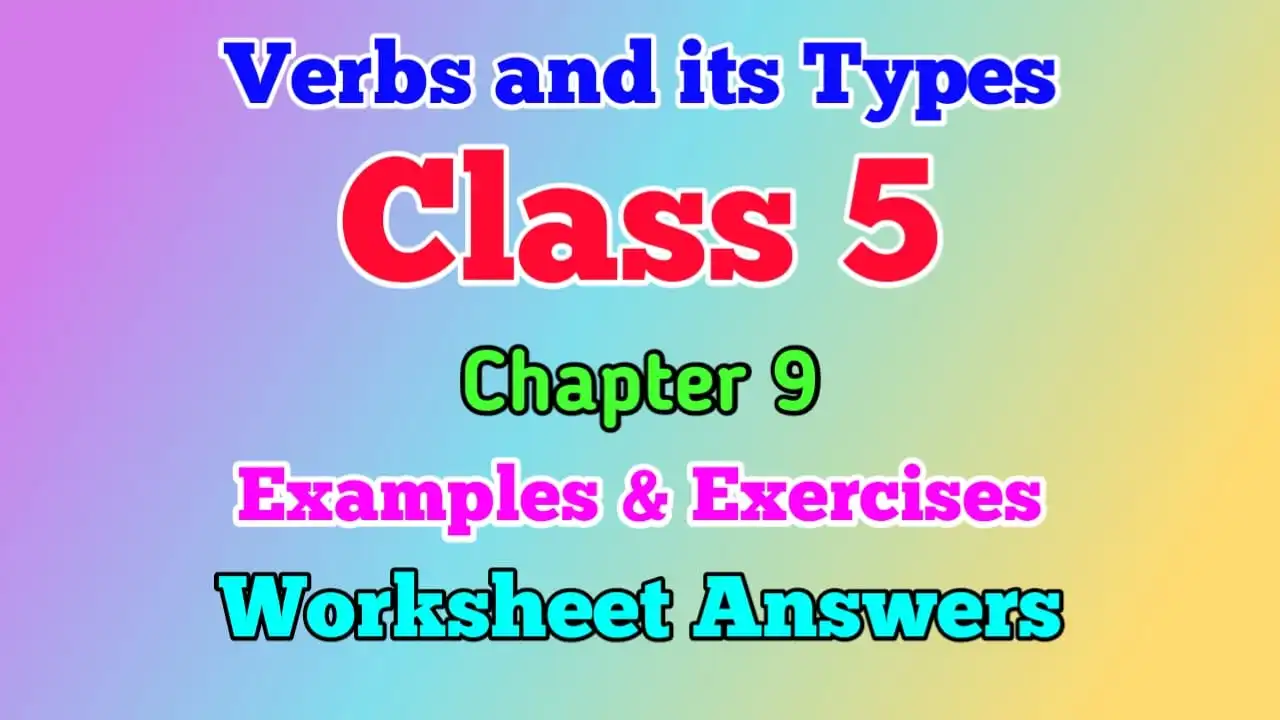Types of Verbs Class 5 English Grammar worksheet has been prepared for learning English Grammar of Class 5 under CBSE, ICSE, and Other State boards as Lesson No 9. Class 5 students in their English Grammar learning process will get help from the Types of Verbs Class 5 English Grammar worksheet to achieve better speaking and writing skills in English.
This Lesson 9, Types of Verbs Class 5 English Grammar worksheet contains – What is a Verb?, Types of Verbs in English Grammar, and Examples of Verbs with a practice worksheet at the end for better knowledge for class 5.
English Grammar eBook Class 5
What is Verb?
(1) Anita is a good girl.
(2) Tiger is a ferocious animal
(3) Anita has two brothers.
(4) The table has four legs
(5) Anita is singing a song.
(6) Birds are flying in the sky.
All the above-underlined words tell us what a person or thing is, what a person or thing has, and what a person or thing does. All these words are called Verbs.
| A verb is a doing word. It describes an action. It tells us,· 1. what a person or thing is.· 2. what a person or thing has. 3. what a person or thing does. |
Types of Verbs with Examples
VERB
- Principal or Main Verb
- Auxiliary or Helping Verb
- Transitive Verb
- Intransitive Verb
- Strong Verb or Irregular Verb
- Weak Verb or Regular verb
Principal or Main Verb
1. I am a boy.
= am – main verb
2. You have an umbrella.
= have – the main verb
3. They do their homework.
= do – the main verb
When there is one verb in a sentence, it is called the Principal or main verb. So, all the above-underlined words are Principal or main verbs.
Auxiliary or Helping Verb
1. I am going to school.
= am – Auxiliary Verb, going – the main verb.
2. You have done the task.
= have – Auxiliary Verb, done– the main verb.
3. They do not play football.
= do – Auxiliary Verb, play– main verb.
When there are two verbs in a sentence, the first one is an Auxiliary or helping verb and the second one is the Principal or Main verb.
Types of Auxiliary or Helping Verb
There are 16 auxiliary verbs in English. Auxiliary Verbs are of two types.
Pure Auxiliary(3)
Examples: ‘Be’, ‘Have’, ‘Do’
- Be’- am, is, are, was, were.
- ‘Have’ – have, has, had.
- ‘Do’ – do, does, did.
‘Be’, ‘Have’, and ‘Do’, are called Pure Auxiliary verbs. These auxiliary verbs can also be used as Principal or Main verbs in a sentence when they stand alone.
Modal Auxiliary(13)
Examples: Shall, will, can, may, could, should, would, might, must, used to, Ought to, need, dare.
Example of Auxiliary or Helping Verb
(a) ‘Be’ ( am, is, are, was, were)
1. I am sick.
=am- Principal verb
2. I am reading now.
= am – auxiliary verb.
(b) ‘Have’ (has, have, had)
1. We have a beautiful picture.
= have – the main verb
2. We have done this work.
= have – Auxiliary verb
(c) ‘Do’ ( do, does, did)
1. I did it.
=did – main verb
2. Did you do it?
=did – auxiliary verb
No modal auxiliary verb can stand alone in a sentence except ‘need’ and ‘dare’. They are called Semi-Modal verbs.
(a) I dare not enter the forest.
= dare – Auxiliary verb
(b) I dare you to debate.
= dare – Main verb
(c) You need not go there.
= Need – Auxiliary verb
(d) You need a good doctor.
= Need – Main verb
Examples of auxiliary verbs in sentences to form negative and interrogative.
(a) I play football.
= I do not play football. (Negative)
= Do I play football? (Interrogative)
(b) You went to school.
=You did not go to school. (Negative)
=Did you go to school? (Interrogative)
(c) She sings a song.
=She does not sing songs. (Negative)
=Does she sing a song? (Interrogative)
| ‘Do’, ‘Did’, or ‘Does’ are used as Auxiliary verbs to form Negative or Interrogative sentences when there will be no ‘Be’ verb, ‘Have’ verb, or Modal Auxiliary verb. |
(d) You are doing the sum.
=You are not doing the sum. ( Negative)
=Are you not doing the sum? ( Interrogative)
(e) They have done the lesson.
=They have not done the lesson. ( Negative)
=Have they done the lesson? ( Interrogative)
(f) You should help the poor.
=You should not help the poor. ( Negative)
= Should you help the poor? ( Interrogative)
(g) You must do it.
=You must not go there. ( Negative)
=Must you go there? ( Interrogative)
(h) I would go there.
=I would not go there. ( Negative)
=Would I go there? ( Interrogative)
(i) It may rain today.
=It may not rain today. ( Negative)
=May it rain today? ( Interrogative)
(j) He can speak French.
=He can not speak French. ( Negative)
=Can he speak French? ( Interrogative)
Transitive Verbs
- Sultana reads books.
- Ravi and Sham play chess.
The above sentences have objects. An object is a person or thing that receives the action of the verbs.
| Verbs that have objects are called Transitive Verbs. |
Intransitive Verbs
- She laughed aloud.
- The horse runs fast.
The above sentences do not have objects.
| Verbs that do not have objects are called Intransitive verbs. |
Verbs both Transitive and Intransitive.
There are some verbs that can be used both as Transitive and Intransitive.
The boy is flying kite. (Transitive, object – kite)
Birds fly. ( Intransitive)
The driver is turning the car. (Transitive, object – the car)
He turns left. ( Intransitive)
She sings a song. (Transitive, object – a song)
The girl sings beautifully. ( Intransitive)
Stop the car. (Transitive, object – the car)
Stop here. ( Intransitive)
He laughs at the poor. (Transitive, object – the poor)
He laughs loudly. ( Intransitive)
You break the cup. (Transitive, object – the cup)
You break suddenly. ( Intransitive)
They bark up the wrong tree. (Transitive, object – wrong tree)
The dog is barking. ( Intransitive)
Farmers grow crops. (Transitive, object – crops)
Young boys grow fast. ( Intransitive)
Strong Verb or Irregular Verbs.
When vowels between the verbs are changed to make past and past participle form, they are called Strong Verbs or Irregular Verbs.
| Present | Past | Past Participle |
| Arise | arose | arisen |
| Eat | ate | eaten |
| Do | did | done |
| Fall | fell | fallen |
| Go | went | gone |
Weak Verbs or Regular verbs
When ‘- d ’, ‘- ed’ ‘ – t ’, are added at the end of the verb to make past and past participle form, they are called Weak Verb or Regular verbs.
| Present | Past | Past Participle |
| Add | added | added |
| Beg | begged | begged |
| Fill | filled | filled |
| Play | played | played |
| Walk | walked | walked |
Worksheet on Types of Verbs Class 5 English Grammar
Types of Verbs Class 5 English Grammar worksheet are even below for self-assessment of how one has gained knowledge from the above discussion on Types of Verbs Class 5 English Grammar.
Types of Verbs Class 5 English Grammar worksheet 1
A. State whether the highlighted verbs are transitive (T) or intransitive (I).
1. Birds fly.
2. Mary Kom won the bout.
3. A light was shining.
4.I love my dog
5. Please speak softly.
6. The minister boarded the aircraft.
7. She sang beautifully
8. Mona loves mangoes.
9. Open the window.
10. The sun was setting
11. He left the gift on the table.
19. They sang the national anthem.
13. She set the chair next to the bed.
14. The man grabbed the bag from the old lady.
15. Grandpa laughed out loud.
16. The receptionist gave the room key to the guest.
Types of Verbs Class 5 English Grammar worksheet 2
B. Make two sentences with these verbs, showing the transitive and Intransitive use of each verb.
1. fly:
This pilot flies almost any aircraft. (transitive)
Birds fly. (intransitive)
2.Sing
3.Turn
4.Break
5.Stop
6.Laugh
7.Bark
Types of Verbs Class 5 English Grammar worksheet 3
C. Underline the verbs of the following sentences:
1. This is my book.
2. We are going to school.
3. He plays football everyday.
4. She loves her brother.
5. I shall teach you a good lesson.
6. She will cook the soup.
7. I had read the book.
Types of Verbs Class 5 English Grammar worksheet 4
D. Tick off (✔) the correct word given within the brackets:
1. My father is/are) a doctor.
2. Amartya (is/are/am) in class VIII.
3. My mother (sing/sings) well.
4. The book is/are) on the table.
5. Students (play/plays) here.
6. The sun (shines/shine) at day.
7. It (has/have) two hundred pages.
Types of Verbs Class 5 English Grammar worksheet 5
E. Fill in the blanks with has, have, is, am, are as needed.
1. They _____ two cars.
2. We _____in the bus.
3. Rahul _____a beautiful pen.
4. Seema _____a nurse.
5. Sumi _____a pet cat.
6. The cat _____a long tail.
7. We _____a garden.
Types of Verbs Class 5 English Grammar worksheet 6
F. Find out the Transitive and Intransitive verbs:
1. He is sleeping.
2. The cow gives us milk.
3. I write a letter.
4. He loves her.
5. Ila rings the bell.
6. Inu washes his clothes.
7. Tapu opened his bag.
8. Bhola speaks the truth.
9. The birds are flying.
10. Open the window.
Types of Verbs Class 5 English Grammar worksheet 7
G. Fill in the gaps with Auxiliary verbs:
1. He _____not go to school.
2. Papa _____cooking food for us.
3. Pari _____not go there yesterday.
4. The thief _____run away.
5. What _____you doing now?
6. Who _____speaking?
7. Soham _____not playing today.
8. Tapas_____ not go yesterday.
9. Manas _____not beat you.
10. A river _____flowing past our village.
Types of Verbs Class 5 English Grammar worksheet 8
H. Write the Main verbs and the Auxiliary verbs in the box.
1. I have a pen.
2. I have done this.
3. He was a student.
4. He was playing cricket.
5. I am a student.
6. I am doing my sum.
7. I do it.
8. I do not draw at all.
9. He is a doctor.
10. He is treating his patient now.
Class 5 English Grammar: All Topics & Chapters????:
Chapter 1. Parts of speech
Chapter 2. The sentence and Types
Chapter 3. Subject and Predicate
Chapter 4. Nouns and their Types
Chapter 5. Noun and Number
Chapter 6. Noun and Gender
Chapter 7. Articles
Chapter 8. Pronouns and their Classifications
Chapter 9. Verbs and Types of Verbs
Chapter 10. Regular Verbs Irregular Verbs List
Chapter 11. Subject and Verb Agreement
Chapter 12. Simple Present Tense
Chapter 13. Present Continuous Tense
Chapter 14. Present Perfect Tense
Chapter 15. Present Perfect Continuous Tense
Chapter 16. Simple Past Tense
Chapter 17. Past Continuous Tense
Chapter 18. Past Perfect Tense
Chapter 19. Past Perfect Continuous Tense
Chapter 20. Simple Future Tense
Chapter 21. Future Continuous Tense
Chapter 22. Future Perfect Tense
Chapter 23. Future Perfect Continuous Tense
Chapter 24. Tense Exercises
Chapter 25. Modal Verbs
Chapter 26. Adjectives and their Types
Chapter 27. Degree of Adjectives
Chapter 28. Adverbs and Comparison
Chapter 29. Prepositions and their Uses
Chapter 30. Conjunctions
Chapter 31. Direct and Indirect Speech
Chapter 32. Transformation of Sentences
Chapter 33. Punctuation







